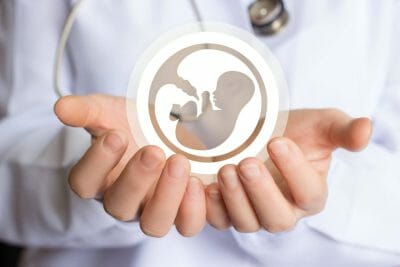Embarking on a fertility journey is a process of experimentation. It takes time and effort to find out what factors are affecting your fertility, and what supplements could best benefit your body in your quest to get pregnant. One of the supplements you may have heard of in your preliminary fertility research is DHEA, aka dehydroepiandrosterone, a hormone that aids in the productions and regulation of the sex hormones, estrogen and testosterone.
There are a variety of DHEA benefits for women: for starters, when trying to get pregnant, DHEA can help boost the hormone levels in your system, priming your body for egg production and fertilization. Read on to learn more about DHEA, and how it’s linked to increased fertility in women.
What is DHEA?
DHEA stands for dehydroepiandrosterone (a thankful acronym for a tongue twister of a hormone). DHEA is naturally produced by our adrenal glands, and then converted into testosterone within the body, making it essential for overall hormonal balance in women. However, as we age, DHEA and testosterone levels in the body tend to decrease, typically after our mid-20’s. This decrease in DHEA can lead to a decrease in fertility for women attempting to get pregnant later in life in their 30’s and 40’s. Given this, many women take DHEA supplements in order to ensure that their DHEA levels are optimal for getting pregnant.
Benefits of DHEA Supplements
DHEA supplements can aid female fertility in a number of ways, including:
Supports Diminished Ovarian Reserve
Diminished Ovarian Reserve is a condition that causes a woman’s ovaries to lose their reproductive potential over time. Reproductive potential is determined by the number and quality of eggs produced by a woman’s ovaries each menstrual cycle. When a woman suffers from Diminished Ovarian Reserve, her ovaries will not produce enough eggs, or eggs of healthy enough quality in order to ensure proper fertilization.
The most common cause of Diminished Ovarian Reserve is aging, but it can also occur when a woman suffers from surgery complications, intense medical treatment (radiation for Cancer), or an unexpected trauma to the pelvis. DHEA can counteract the effects of Diminished Ovarian Reserve, as studies have shown that women suffering from the condition have had higher success rates getting pregnant after taking at least a 60 day course of DHEA.
Increases Ovarian Health
The ovaries need testosterone in order to produce eggs. DHEA supplements aid in the production of testosterone, thereby increasing ovarian health and encouraging the production of plentiful, healthy eggs to be fertilized.
Supports Better IVF Outcomes
When women undergo the process of IVF, or in-vitro fertilization, in order to get pregnant, doctors need to harvest multiple eggs from the ovaries at one time in order to increase the chance of creating a viable embryo outside of the womb. DHEA supplements encourage the growth of numerous, healthy egg cells, which can help to increase the chances of a successful pregnancy by IVF procedure.
Decreases the Risk of Aneuploidy and Miscarriage
Aneuploidy is a condition that occurs when a chromosome in a cell doesn’t replicate properly. This can cause unfortunate birth defects in developing embryos, which can lead to miscarriage. DHEA supplements encourage the growth of healthy egg cells, which reduce the risk of aneuploidy and miscarriage during pregnancy.
Quicker Pregnancy Rates
Studies have shown that women who take DHEA supplements when trying to get pregnant tend to get pregnant faster. This is likely due to the fact that DHEA stimulates egg production in the ovaries, making more eggs available to be fertilized each month.
Higher Chance of Spontaneous Pregnancy
Spontaneous pregnancy occurs when a woman who has previously had a child via IVF gets pregnant again naturally. Studies have shown that women taking DHEA supplements throughout the IVF process have had higher rates of spontaneously conceiving after their first child.
Proper DHEA Dosage for Fertility
DHEA typically comes in capsule form in doses of 25mg. Capsules tend to be taken one to three times per day, depending on the instruction of your healthcare provider. You should always consult with your doctor before beginning any kind of supplement in order to confirm proper dosage and to make sure there are no interactions with medicines or supplements that you’re currently taking.
In Conclusion
DHEA is a hormonal supplement that has been shown to greatly benefit female fertility. It’s a great option for those who are suffering from Diminished Ovarian Reserve, currently going through IVF, or just want to get their ovarian health in the best shape to conceive. In addition to boosting the health and quantity of egg cells produced by the ovaries, DHEA can aid in quicker pregnancies and a higher chance of spontaneous pregnancy in the future. The road to a successful pregnancy can be full of fertility complications, and DHEA can help support you in your journey to conceive.
